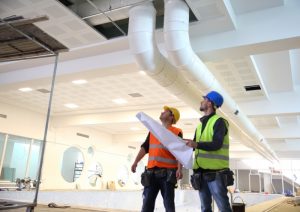What size HVAC units does your business need for proper operation and maximum energy efficiency? Don’t worry if you can’t answer that question immediately, or if you’re not certain what we mean by the “size” of the HVAC units. When it comes to finding the correct commercial HVAC installation in Nashville, TN, you’ll always want to rely on professionals who can answer these questions.
What we want to explain in this post is the importance of commercial HVAC unit sizing, starting with what it is.
What Does “Sizing” Mean for HVAC Units?
When we refer to the “size” of an HVAC unit, we don’t mean its physical size. “Size” here means the system’s heating or cooling capacity, which is measured in BTUs (British Thermal Units) or tons. For cooling, one ton of capacity equals the ability to remove 12,000 BTUs of heat per hour. The unit must be properly sized to meet the specific demands of your building, ensuring consistent comfort without energy waste.
Determining the right size for your HVAC system involves more than just looking at the square footage of your facility. Professionals must consider several other factors that can affect the heating and cooling load, such as the quality of insulation, the number of windows, occupancy, and the specific climate of the region. In Nashville, for example, hot summers and cool winters mean your system must handle both extremes.
How Is an HVAC Unit Sized?
Correctly sizing an HVAC unit requires performing what’s known as a load calculation. This is an in-depth assessment of the building’s heating and cooling requirements, which helps ensure the HVAC system can effectively control the indoor climate without being oversized or undersized. A load calculation takes into account several variables.
For example, a building with poor insulation and large windows facing direct sunlight will require a more powerful system than a similarly sized building with better insulation and fewer windows. Commercial HVAC professionals use specialized software and tools to perform these load calculations accurately.
What Are the Consequences of Inaccurate Sizing?
Improperly sized HVAC units can cause numerous problems:
Undersized HVAC Unit
An undersized unit cannot handle a building’s heating or cooling demands. It will run continuously, trying to reach the desired temperature, but will never get there. This constant operation drives up energy costs and speeds up wear and tear on the system, leading to more frequent breakdowns and a shorter lifespan for the unit.
Oversized HVAC Unit
This may seem like a safer bet, but it has its own set of problems. Oversized systems tend to short-cycle, meaning they cool or heat the space too quickly and then shut off before running through a full cycle. Short cycling leads to uneven temperature distribution, poor humidity control, and energy waste. This constant starting and stopping also puts additional strain on the system, decreasing the unit’s lifespan.
Always Rely on Professionals for Commercial HVAC Installation
Because of the complexity involved in sizing an HVAC system correctly, you must rely on professionals who have the knowledge and tools to perform accurate load calculations. There are no shortcuts, and you do not want to spend money on an expensive HVAC unit that will drain power and need an early replacement. You can count on our professional HVAC installation team for accurate sizing.


